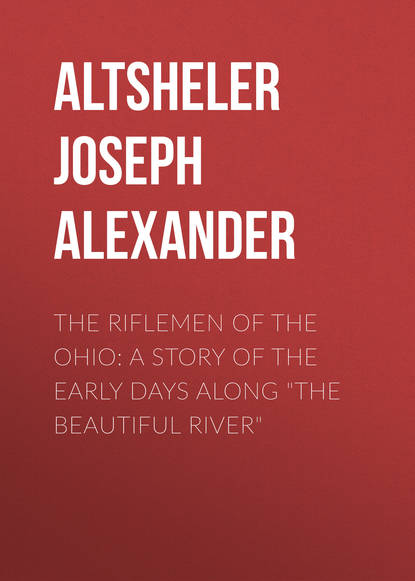По всем вопросам обращайтесь на: info@litportal.ru
(©) 2003-2024.
✖
The Riflemen of the Ohio: A Story of the Early Days along "The Beautiful River"
Настройки чтения
Размер шрифта
Высота строк
Поля
"I'll take that, too," replied Henry.
"Sootae (Beaver)?" said the chief, producing a third.
"I'll risk that, too," replied Henry. "It looks good."
"Yungenah (Dog)?" said the hospitable Timmendiquas, offering a fourth fragment of meat.
Henry looked at it suspiciously.
"Yungenah?" he said. "Now, Chief, would you tell me what Yungenah means?"
"Dog," replied the Wyandot sententiously.
"No, no!" exclaimed Henry. "Take it away."
Timmendiquas smiled benevolently.
"Dog good," he said, "but not make you eat it. Wyandot glad enough to get it."
They continued the journey throughout the afternoon, and did not stop until after sunset. Henry's promise was renewed for the second time, and he slept quietly within the circle of the Wyandots. He awakened once far in the night, and he saw that the watch was most vigilant. White Lightning was awake and sitting up, as also were three warriors. The night was clear and bright save for a few small harmless clouds. Henry saw that he had made no mistake in renewing his promise. The chance of escape had not yet come.
White Lightning noticed that his captive's eyes were open and he walked over to him. This youth, so strong and so skillful, so brave and so frank, appealed to the young chief. He would regret the necessity of putting him to death. A way of escaping it would be welcome.
"It is not like last night," he said pleasantly.
"No," said Henry. "There is no chance of another storm."
"Oghtserah," said the chief, pointing to the small, harmless clouds.
"But they are too little to mean anything," said Henry, guessing from the chief's gesture that "Oghtserah" meant clouds.
"You learn Wyandot," said the chief in the same pleasant tone. "You learn fast. See Tegshe."
He glanced up.
"Stars?" guessed Henry.
The chief smiled again.
"It is right," he said. "You stay long with us, you learn to talk to Wyandot. Look!"
He held up one finger.
"Scat," he said.
He held up two.
"Tindee," he said.
He held up three.
"Shaight," he said.
He held up four. "Andaught."
Five—"Weeish."
Six—"Washaw."
Seven—"Sootare."
Eight—"Acetarai."
Nine—"Aintru."
Ten—"Aughsah."
"Now you count ten," he said somewhat in the tone of a schoolmaster to Henry.
"All right," said Henry tractably. "Here goes: Scat, Tindee, Shaight, Andaught, Weeish, Washaw, Sootare, Acetarai, Aintru, Aughsah."
The chief's smile deepened.
"You good memory," he said. "You learn very fast." Then he added after a moment's hesitation: "You make good Wyandot. Wyandots small nation, but bravest, most cunning and most enduring of all. Wyandot being burned at the stake calls for his pipe and smokes it peacefully while he dies in the fire."
"I don't doubt it," said Henry, who had heard of such cases.
The chief glanced at him and concluded that he said enough on that point. Once more he looked up.
"Washuntyaandeshra."
"The moon," said Henry. "Yes, it's bright."
"You learn. You remember," said the chief. "Now you sleep again."
He walked away, and Henry closed his eyes, but did not go to sleep just yet. He had understood Timmendiquas perfectly, and it troubled him. He liked the young chief, but white he was and white he would remain. He resolutely forced the question out of his mind, and soon he was fast asleep again.
CHAPTER IV
THE FOREST VILLAGE
They traveled another day and another, always rapidly. Henry continued his policy and asked no questions. He divined, however, that the Wyandots were on the way to a village of theirs, either permanent or temporary, probably the latter, as they were far west of the country conceded by the other Indians to be Wyandot.
He surmised, also, that the red alliance against the white vanguard had been enlarged until it included all the tribes of the Ohio Valley north of the river. He knew very well how all these tribes were situated, their great villages at Chillicothe, Piqua, and other places, whence it was easy for them to make raids upon the settlements south of the Ohio and then retreat into the vast wilderness north of it, where it was exceedingly dangerous to follow them. Should he escape, he would not be sorry to have been a prisoner, since he might learn all their plans, knowledge as precious as diamonds.
On the fourth day they checked their speed, and a lithe young Indian whom Henry heard called Thraintonto, which means in Wyandot The Fox, stripped himself of his breech clout, gave his long and defiant scalp lock a somewhat fiercer curl, and darted ahead of the band.
He was the swiftest runner in the war party, chosen specially by Timmendiquas for an important duty, and Henry knew very well the nature of his errand. The Wyandot village now lay not far away, and Thraintonto sped ahead, a messenger, to tell that the war party had achieved victory, and was approaching with the proof of it.











